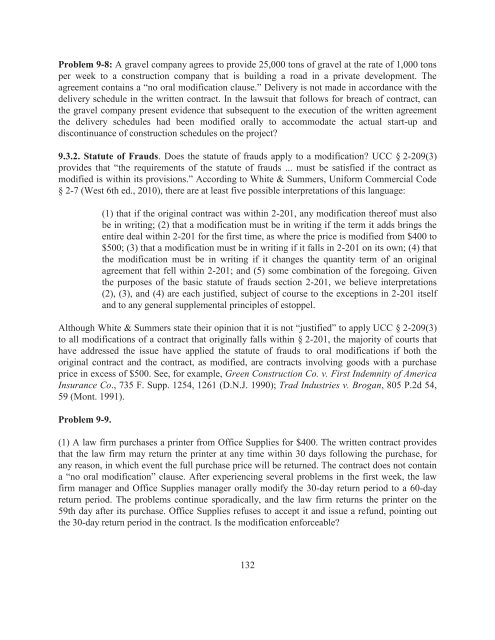Sales and Leases - A Problem-based Approach, 2016a
Sales and Leases - A Problem-based Approach, 2016a
Sales and Leases - A Problem-based Approach, 2016a
Create successful ePaper yourself
Turn your PDF publications into a flip-book with our unique Google optimized e-Paper software.
<strong>Problem</strong> 9-8: A gravel company agrees to provide 25,000 tons of gravel at the rate of 1,000 tons<br />
per week to a construction company that is building a road in a private development. The<br />
agreement contains a “no oral modification clause.” Delivery is not made in accordance with the<br />
delivery schedule in the written contract. In the lawsuit that follows for breach of contract, can<br />
the gravel company present evidence that subsequent to the execution of the written agreement<br />
the delivery schedules had been modified orally to accommodate the actual start-up <strong>and</strong><br />
discontinuance of construction schedules on the project?<br />
9.3.2. Statute of Frauds. Does the statute of frauds apply to a modification? UCC § 2-209(3)<br />
provides that “the requirements of the statute of frauds ... must be satisfied if the contract as<br />
modified is within its provisions.” According to White & Summers, Uniform Commercial Code<br />
§ 2-7 (West 6th ed., 2010), there are at least five possible interpretations of this language:<br />
(1) that if the original contract was within 2-201, any modification thereof must also<br />
be in writing; (2) that a modification must be in writing if the term it adds brings the<br />
entire deal within 2-201 for the first time, as where the price is modified from $400 to<br />
$500; (3) that a modification must be in writing if it falls in 2-201 on its own; (4) that<br />
the modification must be in writing if it changes the quantity term of an original<br />
agreement that fell within 2-201; <strong>and</strong> (5) some combination of the foregoing. Given<br />
the purposes of the basic statute of frauds section 2-201, we believe interpretations<br />
(2), (3), <strong>and</strong> (4) are each justified, subject of course to the exceptions in 2-201 itself<br />
<strong>and</strong> to any general supplemental principles of estoppel.<br />
Although White & Summers state their opinion that it is not “justified” to apply UCC § 2-209(3)<br />
to all modifications of a contract that originally falls within § 2-201, the majority of courts that<br />
have addressed the issue have applied the statute of frauds to oral modifications if both the<br />
original contract <strong>and</strong> the contract, as modified, are contracts involving goods with a purchase<br />
price in excess of $500. See, for example, Green Construction Co. v. First Indemnity of America<br />
Insurance Co., 735 F. Supp. 1254, 1261 (D.N.J. 1990); Trad Industries v. Brogan, 805 P.2d 54,<br />
59 (Mont. 1991).<br />
<strong>Problem</strong> 9-9.<br />
(1) A law firm purchases a printer from Office Supplies for $400. The written contract provides<br />
that the law firm may return the printer at any time within 30 days following the purchase, for<br />
any reason, in which event the full purchase price will be returned. The contract does not contain<br />
a “no oral modification” clause. After experiencing several problems in the first week, the law<br />
firm manager <strong>and</strong> Office Supplies manager orally modify the 30-day return period to a 60-day<br />
return period. The problems continue sporadically, <strong>and</strong> the law firm returns the printer on the<br />
59th day after its purchase. Office Supplies refuses to accept it <strong>and</strong> issue a refund, pointing out<br />
the 30-day return period in the contract. Is the modification enforceable?<br />
132


















